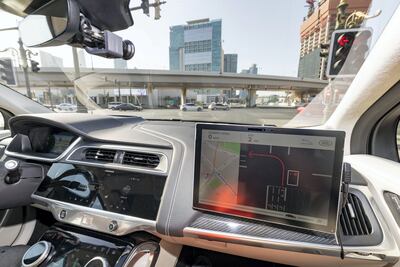Although the idea of self-driving cars is commonly associated with science fiction, enjoying safe but fully autonomous transport has been one of humanity’s stubbornly persistent dreams for centuries.
As far back 1478, Leonardo da Vinci was producing designs for a three-wheeled cart that could move without being pushed or pulled. In 1925, inventor Francis Houdina drove a remote-controlled car through Manhattan, but his project floundered when it lost control and hit another vehicle. General Motors tested a vehicle controlled by radio waves at the 1939 World’s Fair in New York and Japanese engineers used a camera system to operate the world’s first truly self-driving passenger vehicle in 1977. However, technology has made great advancements in recent decades.
This recent news that the UAE Cabinet approved the country’s first preliminary national licence for self-driving cars, granting it to Chinese company WeRide, therefore joins a time-honoured tradition of developing vehicles that can get us from A to B under their own steam. But far from being a novelty or gimmick, autonomous transport is important, given the profound changes it could mean for our lives.
Self-driving vehicles offer the possibility of better road safety, higher traffic efficiency, more mobility and, crucially, fewer emissions – an important part of the UAE’s goal of reaching net-zero by 2050. When combined with comprehensive public transport, self-driving vehicles could play a valuable part in making our cities more open and liveable, and reducing human error on the roads.

There is still a long way to go before the technology is perfected. Making it affordable, scalable and – most importantly – safe, will be crucial to winning the travelling public’s support and having wide-scale implementation. Here is where the role of close outside regulation comes into play. Stepping into a driverless car may take some convincing for many people, and customers will want to know that they can trust the technology, particularly on narrower, busier routes.
The testing and scrutiny already put into driverless vehicles in the Emirates is considerable. For example, before receiving this new licence, WeRide's Robotaxi spent more than a year testing its operations on UAE roads. In April, Sheikh Mohammed bin Rashid, Vice President and Ruler of Dubai, issued a law to govern the use of self-driving cars that outlined how the emirate’s Roads and Transport Authority would regulate their use, including the issuing of licences and transfer of ownership. In Abu Dhabi, the autonomous Txai service was launched in December 2021, following rigorous road trials.
The authorities’ close involvement in the operation of self-driving cars offers a template on how to deploy this technology successfully. The cars may seem futuristic, but Dubai’s ambitious target of having 25 per cent of its transportation being fully autonomous is only seven years away.
With the amount of money and investment involved in this industry worldwide – one estimate claims the value of the global autonomous vehicle market is forecast to be worth $1.8 trillion by 2030, up from $94.4 billion in 2021 – it is clear that such vehicles are here to stay. Winning the public’s confidence will be key to the industry’s success, and private companies working in partnership with government will go a long way to securing that confidence.
We are some way from Leonardo’s riderless cart, but the revolution promised by autonomous transport is still in its early stages. When it comes to eventually turbo-charging that revolution, the UAE will be a place to watch.


